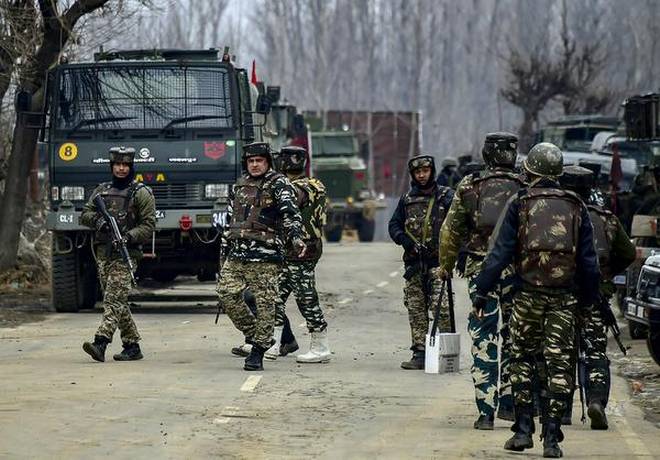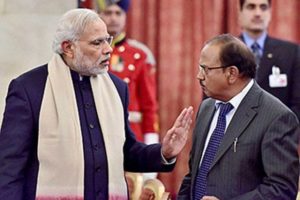The Need Of The Hour: Streamlining National Security Planning
Aug 30, 2019 | Shalini Rai
FILE PHOTO: Paramilitary forces personnel can be seen during an encounter with militants in Kashmir (Representational Image)
On Thursday, Indian intelligence agencies issued advisories to port authorities about possible attacks by Pakistani terrorists on Gujarat via the sea route. This comes at a time when the need to streamline intelligence gathering and sharing has never been more pressing. Any intelligence is only as good as its ‘actionable’ attributes. If you have the information but can do little or nothing about it, it is similar to having no intel at all.
The present government has demonstrated an unusual urgency in revamping the national security apparatus. This includes the revival of the Strategic Policy Group (SPG), under the chairmanship of the National Security Advisor (NSA) Ajit Doval, to assist the National Security Council (NSC,) in moving forward with a long-term strategic defence review. The SPG was set up by the Atal Bihari Vajpayee government in 1999 and was headed by the cabinet secretary. Now, though, the power shifts to the NSA, making an already powerful office even more robust.
The SPG, whose members include the NITI Aayog vice-chairman, the cabinet secretary, the three military chiefs, the Reserve Bank of India governor, the foreign secretary, home secretary, finance secretary and the defence secretary, will now be the central body for inter-ministerial coordination and integration of inputs in forming national security policies.
The government made significant changes to India’s national security architecture in 2018. These included the above-mentioned revival of the Strategic Policy Group (SPG) and the addition of two more deputy national security advisors in the National Security Council Secretariat (NSCS).
Concurrent to this, there is also talk of the necessity to make the Intelligence Bureau (IB) the nodal agency for counter-terrorism initiatives. Experts say the Research and Analysis Wing (RAW), which is currently the unofficial lead intelligence agency in executing India’s counter-terrorism efforts, should instead be allowed to continue with its primary objective of intelligence gathering and analysis.

Recently, there was the widely-discussed elevation of the rank of NSA from a minister of state to a cabinet minister. The government had undertaken a similar exercise to transform India’s security architecture in the aftermath of the 26/11 Mumbai attacks. Among the key decisions made then were the creation of the National Investigation Agency (NIA), the National Intelligence Grid (NATGRID) and a rejig of the National Security Guard (NSG). The most ambitious of these plans was the one to establish an overarching counter-terrorism body – the National Counter Terrorism Centre (NCTC).
Although Indian counter-terrorism efforts have improved significantly since 2008, the ever-shifting nature of the threat makes streamlining of intelligence gathering and law enforcement crucial.
The RAW is, at present, the unofficial leading intelligence gathering agency responsible for India’s continued efforts at countering terrorism. But this is far from the objective for which the agency was created. That objective was to monitor the political and military developments of countries which have a direct impact on India’s security and foreign policy.
The global security scenario underwent unprecedented changes post 9/11 and then, the same thing happened in India after 26/11. This dramatic shift in priorities pushed RAW towards gathering intelligence to thwart terrorist threats and away from its fundamental objective.
Counter-terrorism in India involves a combination of intelligence, law enforcement and military action. It needs the participation of the internal security apparatus. There is little sense in having the RAW gather intelligence for operations carried out by the Intelligence Bureau (IB), police, paramilitary forces and the Army. The IB is best-placed to collect and analyze intelligence related to counter-terrorism.
Experts believe that an adequate response to terror activities is best carried out under a well-defined command and control system. In this field, the role of the RAW leads to double processing of intelligence. The RAW passes it on to the IB, which then shares it with responders.
Additionally, this comes on the heels of the government deciding to establish a Defence Planning Committee (DPC), comprising the chairman of the chiefs of staff committee, the three service chiefs, the defence, expenditure and foreign secretaries. The DPC works under the NSA to improve India’s ability for long-term strategizing. Also, the Prime Minister recently gave the go-ahead for the formation of the three tri-services agencies — for cyber, space, and special operations — across the three armed forces.
This comes at a time when India’s national security planning stands at a crossroads. The silo-driven approach to national security has led to the lack of an integrated view. It occurs when departments or management groups do not share information, goals, tools, priorities and processes with other departments. The silo mentality is believed to impact operations, reduce employee morale and may contribute to the overall failure of an enterprise and its ‘culture’.
In India, the three services, as well as the civilian and defence agencies, are often seen to be working at cross-purposes. An ad-hoc approach to dealing with counter-terrorism and national security matters means that more often than not, issues like threat perception and force structure are not managed through a centralized and authoritative overview. Instead, individual services tend to be driving the agenda at their own levels.
In order to change the status quo, what is an absolute must is a transformative shift in mindset, structures and processes. A near permanent pressure on scarce resources, combined with a rapidly-evolving security environment, underscores the need for strategic defence and security planning.
Whether it is the rejig of the functions of the RAW and the IB, or the need to streamline the security apparatus within the juggernaut of the three Indian defence forces, the need of the hour is to break down the silo mentality and focus on operational readiness. National security planning needs to be treated with an urgency it has so far been found lacking in.
In India, calls for a reform of the counter-terrorism and security apparatus have existed as long as the current system itself. The drive is built upon extending resource integration and coordination throughout defence and security policymaking. India is still, worryingly, engaged in a debate to move towards leaner force structures. This, at a time when advances in technology are revolutionizing warfare.
There is a pressing need to cut the flab since over half of the annual defence budget goes towards meeting salary and pension requirements, and this is clearly not sustainable. What will also have to be brought in sync with each other are cumbersome defence procurement processes and the exigencies of the ‘Make In India’ initiative.
